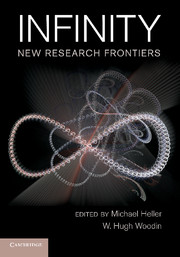Book contents
- Frontmatter
- Contents
- Contributors
- Preface
- Acknowledgments
- Introduction
- I Perspectives on Infinity from History
- II Perspectives on Infinity from Mathematics
- III Technical Perspectives on Infinity from Advanced Mathematics
- 4 The Realm of the Infinite
- 5 A Potential Subtlety Concerning the Distinction between Determinism and Nondeterminism
- 6 Concept Calculus: Much Better Than
- IV Perspectives on Infinity from Physics and Cosmology
- V Perspectives on Infinity from Philosophy and Theology
- Index
- References
6 - Concept Calculus: Much Better Than
Published online by Cambridge University Press: 07 June 2011
- Frontmatter
- Contents
- Contributors
- Preface
- Acknowledgments
- Introduction
- I Perspectives on Infinity from History
- II Perspectives on Infinity from Mathematics
- III Technical Perspectives on Infinity from Advanced Mathematics
- 4 The Realm of the Infinite
- 5 A Potential Subtlety Concerning the Distinction between Determinism and Nondeterminism
- 6 Concept Calculus: Much Better Than
- IV Perspectives on Infinity from Physics and Cosmology
- V Perspectives on Infinity from Philosophy and Theology
- Index
- References
Summary
My contribution to this volume is the initial publication in concept calculus. This is the term I used to describe a new development that seeks to connect two structures that are normally thought to have little or no connection.
On the one hand, there is ordinary commonsense thinking. Generally speaking, ordinary commonsense thinking is rather unstructured and has little in the way of the careful exactness that drives science.
Nevertheless, philosophers have long been committed to taking many aspects of ordinary commonsense thinking at face value and to searching and analyzing fundamental principles. For instance, consider the development of ordinary language philosophy (see, e.g., http://en.wikipedia.org/wiki/Ordinary_language_philosophy).
On the other hand, there is mathematical thinking. Here there has been a tremendously successful and productive development in laying out and analyzing fundamental principles.
Several different approaches apply to the analysis of ordinary mathematical thinking. The most well known and well studied of these are in terms of set theory. Others include class theory and category theory.
It has been established that all of these different approaches to the analysis of ordinary mathematical thinking result in foundational systems that are, in an appropriate and precise sense, equivalent. In other words, each one can be interpreted in all of the others.
In concept calculus, we seek foundational systems for commonsense concepts, as opposed to mathematical concepts. The fundamental principles that are uncovered are plausible or compelling to varying extents. We are feeling our way in identifying fundamental principles, at this very early stage.
- Type
- Chapter
- Information
- InfinityNew Research Frontiers, pp. 130 - 164Publisher: Cambridge University PressPrint publication year: 2011



